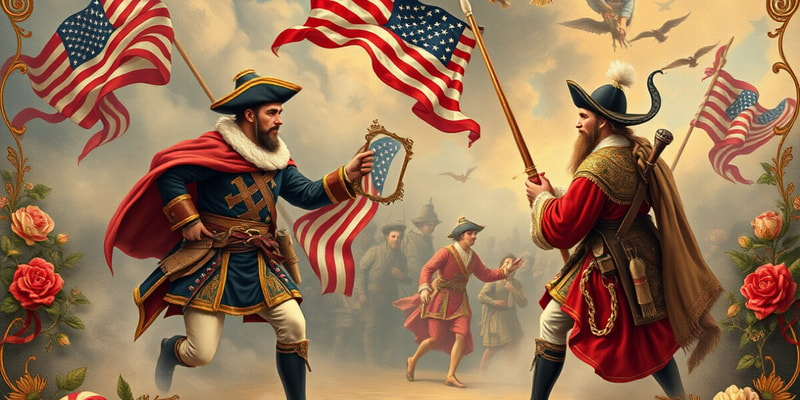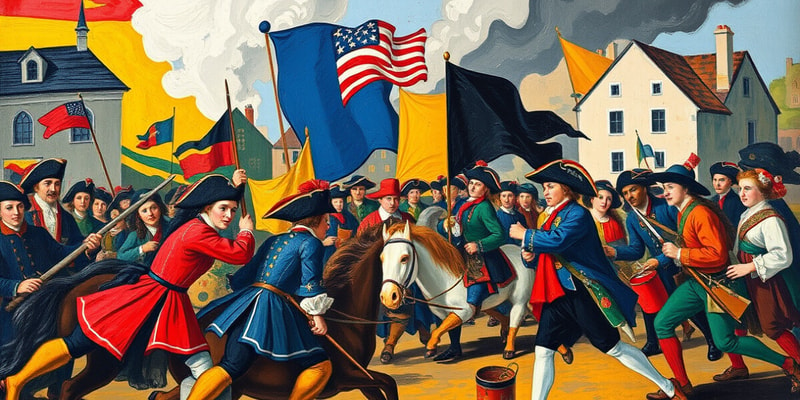Podcast
Questions and Answers
What was the main purpose of the Declaratory Act of 1766?
What was the main purpose of the Declaratory Act of 1766?
The Battle of Saratoga was a significant American defeat that caused France to withdraw its support.
The Battle of Saratoga was a significant American defeat that caused France to withdraw its support.
False
Match the following events with their significance:
Match the following events with their significance:
Battle of Yorktown = Concluded the Revolutionary War Whiskey Rebellion = Showed federal power under the Constitution Proclamation of Neutrality = Set a precedent for U.S. foreign policy Valley Forge = Improved Continental Army's discipline
What was a consequence of the Coercive Acts (Intolerable Acts) of 1774?
What was a consequence of the Coercive Acts (Intolerable Acts) of 1774?
Signup and view all the answers
The Federalists supported a strong central government and were pro-French.
The Federalists supported a strong central government and were pro-French.
Signup and view all the answers
What was a major effect of the Townshend Acts of 1767?
What was a major effect of the Townshend Acts of 1767?
Signup and view all the answers
How did Shays' Rebellion impact the U.S. government structure?
How did Shays' Rebellion impact the U.S. government structure?
Signup and view all the answers
What was the significance of the Battle of Yorktown in 1781?
What was the significance of the Battle of Yorktown in 1781?
Signup and view all the answers
What was President Washington's stance regarding foreign conflicts as indicated by the Proclamation of Neutrality in 1793?
What was President Washington's stance regarding foreign conflicts as indicated by the Proclamation of Neutrality in 1793?
Signup and view all the answers
What was one consequence of the Coercive Acts (Intolerable Acts) of 1774?
What was one consequence of the Coercive Acts (Intolerable Acts) of 1774?
Signup and view all the answers
What principle did Federalists support regarding the structure of government?
What principle did Federalists support regarding the structure of government?
Signup and view all the answers
The XYZ Affair was a diplomatic incident that resulted in which of the following?
The XYZ Affair was a diplomatic incident that resulted in which of the following?
Signup and view all the answers
What did the Whiskey Rebellion reveal about the federal government under the Constitution?
What did the Whiskey Rebellion reveal about the federal government under the Constitution?
Signup and view all the answers
What was the main effect of the Townshend Acts of 1767 on colonial sentiment?
What was the main effect of the Townshend Acts of 1767 on colonial sentiment?
Signup and view all the answers
What event directly prompted the First Continental Congress to convene in 1774?
What event directly prompted the First Continental Congress to convene in 1774?
Signup and view all the answers
Which statement best describes the outcome of the Battle of Saratoga in 1777?
Which statement best describes the outcome of the Battle of Saratoga in 1777?
Signup and view all the answers
What was the consequence of Shays' Rebellion in the late 1780s?
What was the consequence of Shays' Rebellion in the late 1780s?
Signup and view all the answers
How did the Whiskey Rebellion demonstrate the federal government's authority?
How did the Whiskey Rebellion demonstrate the federal government's authority?
Signup and view all the answers
What stance did the Federalists and Democratic-Republicans take regarding foreign alliances?
What stance did the Federalists and Democratic-Republicans take regarding foreign alliances?
Signup and view all the answers
What was a significant effect of the XYZ Affair on American public opinion?
What was a significant effect of the XYZ Affair on American public opinion?
Signup and view all the answers
What did the Proclamation of Neutrality established by Washington in 1793 signify for U.S. foreign policy?
What did the Proclamation of Neutrality established by Washington in 1793 signify for U.S. foreign policy?
Signup and view all the answers
What was one immediate effect of the French and Indian War on Britain?
What was one immediate effect of the French and Indian War on Britain?
Signup and view all the answers
Which policy did Britain adopt after the French and Indian War that increased colonial resentment?
Which policy did Britain adopt after the French and Indian War that increased colonial resentment?
Signup and view all the answers
How did the French and Indian War contribute to the path to the American Revolution?
How did the French and Indian War contribute to the path to the American Revolution?
Signup and view all the answers
Which of the following reflects a continuity in colonial attitudes after the French and Indian War?
Which of the following reflects a continuity in colonial attitudes after the French and Indian War?
Signup and view all the answers
What major change in British policy occurred as a result of the French and Indian War?
What major change in British policy occurred as a result of the French and Indian War?
Signup and view all the answers
What was a significant difference between the American and French Revolutions?
What was a significant difference between the American and French Revolutions?
Signup and view all the answers
What emphasized the beliefs of the Federalists after the French and Indian War?
What emphasized the beliefs of the Federalists after the French and Indian War?
Signup and view all the answers
Which aspect of the government structure did the Democratic-Republicans advocate?
Which aspect of the government structure did the Democratic-Republicans advocate?
Signup and view all the answers
Study Notes
End of Salutary Neglect
- Britain shifted from hands-off policy to stricter control after the French and Indian War, enforcing taxes and regulations on the colonies to pay war debts.
- The Declaratory Act (1766) asserted Parliament's right to tax and legislate for the colonies, despite repealing the Stamp Act.
- The Townshend Acts (1767) imposed duties on imports like tea, glass, and paper, triggering colonial boycotts and resistance.
- The Coercive Acts (Intolerable Acts) of 1774 punished Massachusetts for the Boston Tea Party, closing Boston Harbor and restricting colonial self-government. This led to the First Continental Congress.
Revolutionary War
- Valley Forge (1777-78) marked a harsh winter encampment for the Continental Army, but also a period of crucial training under Baron von Steuben which improved their discipline and effectiveness.
- The Battle of Saratoga (1777) was a turning point in the war. American victory convinced France to openly support the colonies, providing much-needed resources and military aid.
- The Battle of Yorktown (1781) saw the final major battle of the Revolutionary War. British General Cornwallis surrendered, leading to the recognition of American independence.
Early Republic and the Constitution
- Shays' Rebellion (1786-87) saw Massachusetts farmers rebel against taxes and debt, exposing weaknesses in the Articles of Confederation and prompting the Constitutional Convention.
- The Proclamation of Neutrality (1793) established a precedent for US foreign policy by declaring the nation neutral in the conflict between France and Britain.
- The Whiskey Rebellion (1794) saw western farmers protest an excise tax on whiskey. President Washington's response demonstrated the federal government's authority under the Constitution.
Federalists vs. Democratic-Republicans
- The Federalists, led by Alexander Hamilton, favored a strong central government, a pro-British foreign policy, and economic development.
- The Democratic-Republicans, led by Thomas Jefferson, favored strong state governments, a pro-French foreign policy, and limited government intervention in the economy.
Early Foreign Policy Crises
- The Quasi-War (1798-1800) was an undeclared naval conflict between the US and France, triggered by tensions stemming from the French Revolution and the XYZ Affair.
- The XYZ Affair (1797-98) involved French officials demanding bribes for negotiations, which sparked anti-French sentiment in the US and contributed to the Quasi-War.
Alien and Sedition Acts
- The Alien and Sedition Acts (1798) granted the government the power to deport foreigners and punish government critics, provoking debates over free speech and states' rights.
Key Figures
- Benjamin Franklin: Founding Father, diplomat, inventor, and key figure in securing French support during the Revolution. He drafted the Declaration of Independence, negotiated the Treaty of Paris (ending the Revolution), and advocated for unity at the Constitutional Convention.
- Alexander Hamilton: Founding Father, first Secretary of the Treasury, and leader of the Federalist Party. He established the national bank, proposed economic policies to strengthen the federal government, and authored many of the Federalist Papers.
End of Salutary Neglect
- Britain shifted from a hands-off approach to a stricter governance of the colonies after the French and Indian War to pay off war debts
- This change included increased enforcement of colonial taxes and regulations
Declaratory Act
- Passed by Parliament in 1766
- Asserted Parliament's right to tax and legislate for all colonies "in all cases whatsoever"
Townshend Acts
- Enacted in 1767
- Levied taxes on imported goods like tea, glass, and paper
- Colonists objected to these taxes, leading to boycotts
Coercive Acts
- Passed in 1774 in response to the Boston Tea Party
- Punished Massachusetts for its defiance by closing Boston Harbor and reducing colonial self-government
- These acts contributed to the escalation of tensions between colonists and Britain
Valley Forge
- Winter encampment of the Continental Army from 1777 to 1778
- The army endured harsh conditions and faced shortages
- It's notable for the arrival of Baron von Steuben, who implemented training programs and improved discipline and effectiveness for the army
Battle of Saratoga
- Turning point in the Revolutionary War
- American victory in 1777 convinced France to openly support the colonies
- This intervention was crucial to the American success
Battle of Yorktown
- Final major battle of the Revolutionary War
- British General Cornwallis surrendered to American and French forces in 1781
- This defeat led to American independence
Shays' Rebellion
- Uprising of farmers in Massachusetts in 1786-1787
- Protesting taxes and debt
- Exposed weaknesses in the Articles of Confederation, prompting the Constitutional Convention
Proclamation of Neutrality
- 1793
- Declared by President Washington
- Declared the U.S.'s neutrality in the conflict between France and Britain
- Established a precedent for U.S. foreign policy
Whiskey Rebellion
- 1794
- Uprising of farmers in western Pennsylvania in protest of an excise tax on whiskey
- Washington's response demonstrated the federal government's power under the newly adopted Constitution
Federalists
- Advocated for a strong central government
- Led by Alexander Hamilton
- Favored close ties with Britain
Democratic-Republicans
- Supported strong state governments
- Led by Thomas Jefferson
- Favored close ties with France
Quasi-War
- 1798-1800
- Undeclared naval conflict between the U.S. and France
- Resulted from tensions after the French Revolution and the XYZ Affair
XYZ Affair
- 1797-1798
- Diplomatic incident where French officials demanded bribes from American diplomats for negotiations
- Sparked anti-French sentiment in the U.S. and contributed to the Quasi-War
Alien and Sedition Acts
- Passed in 1798
- Granted the government powers to deport foreigners and punish critics of the government
- Led to debates over free speech and states' rights
Benjamin Franklin
- Founding Father, diplomat, inventor, and key figure in securing French support during the Revolution
- Drafted the Declaration of Independence
- Negotiated the Treaty of Paris, ending the Revolutionary War
- Advocated for unity at the Constitutional Convention
Alexander Hamilton
- Founding Father
- First Secretary of the Treasury
- Leader of the Federalist Party
- Established the National Bank
- Implemented economic policies designed to strengthen the federal government and promote national unity
- Authored many of the Federalist Papers, which argued for the adoption of the Constitution
End of Salutary Neglect
- Britain's hands-off policy towards the colonies ended after the French and Indian War.
- Increased taxes and regulations were enforced on the colonies to pay for war debts.
Declaratory Act (1766)
- Parliament asserted its authority to tax and make laws for the colonies.
- The act was passed after the repeal of the Stamp Act.
Townshend Acts (1767)
- Imposed duties on imports like tea, glass, and paper.
- Angered colonists and led to boycotts.
Coercive Acts (Intolerable Acts) (1774)
- Punished Massachusetts for the Boston Tea Party.
- Closed Boston Harbor and reduced colonial self-government.
- Led to the First Continental Congress.
Valley Forge (1777-78)
- Winter encampment of the Continental Army.
- The army endured extreme hardship.
- Training under Baron von Steuben improved discipline and effectiveness.
Battle of Saratoga (1777)
- Turning point in the Revolutionary War.
- American victory convinced France to openly support the colonies.
Battle of Yorktown (1781)
- Final major battle of the Revolutionary War.
- British General Cornwallis surrendered, leading to American independence.
Shays' Rebellion (1786-87)
- Uprising of Massachusetts farmers protesting taxes and debt.
- Exposed weaknesses in the Articles of Confederation.
- Prompted the Constitutional Convention.
Proclamation of Neutrality (1793)
- Washington declared the U.S. neutral in the conflict between France and Britain.
- Set a precedent for U.S. foreign policy.
Whiskey Rebellion (1794)
- Western farmers protested an excise tax on whiskey.
- Washington's response demonstrated the federal government’s power under the Constitution.
Federalists vs. Democratic-Republicans
- Federalists: Strong central government, supported by Alexander Hamilton, favored British interests.
- Democratic-Republicans: Strong state governments, supported by Thomas Jefferson, favored French interests.
Quasi-War (1798-1800)
- Undeclared naval conflict between the U.S. and France.
- Prompted by tensions after the French Revolution and the XYZ Affair.
XYZ Affair (1797-98)
- French officials demanded bribes for negotiations with the U.S.
- Led to anti-French sentiment in the U.S. and the Quasi-War.
Alien and Sedition Acts (1798)
- Gave the government power to deport foreigners and punish government critics.
- Led to debates over free speech and states' rights.
Benjamin Franklin
- Founding Father, diplomat, inventor, and key figure in securing French support during the Revolution.
- Drafted the Declaration of Independence.
- Negotiated the Treaty of Paris (ending the Revolution).
- Advocated for unity at the Constitutional Convention.
Alexander Hamilton
- Founding Father, first Secretary of the Treasury, and leader of the Federalist Party.
- Established the national bank.
- Proposed economic policies to strengthen the federal government.
- Authored many of the Federalist Papers.
Immediate Effects of the French and Indian War
- Britain’s increased debt from the war led to new taxes placed on the American colonies
- The Proclamation of 1763 restricted colonial settlement west of the Appalachian Mountains, frustrating colonists eager for land
- Britain moved away from its policy of salutary neglect and implemented stricter regulations and taxes on the colonies, such as the Sugar Act and Stamp Act, which increased colonial resentment
Long-Term Effects of the French and Indian War
- The shared wartime experiences and opposition to British policies fostered a sense of unity among the colonies
- The increased taxes and restrictions imposed after the war laid the groundwork for the American Revolution by escalating colonial resistance to British rule
Change and Continuity
- After the French and Indian War, Britain transitioned from a hands-off approach to a more direct and controlling policy toward the colonies
- The shift from the Articles of Confederation to the Constitution reflects a change from a weak central government to a stronger federal structure
- Despite seeking more autonomy, many colonists continued to identify as British subjects
- The ideals of liberty and self-governance remained central throughout the colonial period and into the early republic
Comparing Revolutions
- Both the American and French Revolutions aimed to overthrow perceived tyrannical authority and emphasized popular sovereignty and democratic ideals
- The American Revolution focused on separating from Great Britain, while the French Revolution involved the internal restructuring of French society, including the abolition of monarchy and feudal privileges
Comparing Federalists and Democratic-Republicans
- Federalists, led by Alexander Hamilton, advocated for a strong central government, close ties with Great Britain, and prioritized industry and commerce
- Democratic-Republicans, led by Thomas Jefferson, supported states' rights, close ties with France, and emphasized agriculture and rural life
Differences in Beliefs: Federalists vs. Democratic-Republicans
- Federalists believed in a strong central government to maintain order and boost economic growth, supporting a national bank and tariffs to protect American industry
- Federalists favored a loose interpretation of the Constitution, allowing for implied powers
- Federalists viewed Great Britain as a model and preferred closer relations with it
- Democratic-Republicans advocated for states' rights, fearing a strong central government could lead to tyranny
- Democratic-Republicans opposed a national bank, deeming it unconstitutional and harmful to farmers
- Democratic-Republicans favored a strict interpretation of the Constitution, limiting federal powers
- Democratic-Republicans supported the French Revolution and sympathized with republican movements abroad
Studying That Suits You
Use AI to generate personalized quizzes and flashcards to suit your learning preferences.
Description
This quiz explores the pivotal events surrounding the end of Salutary Neglect and the Revolutionary War. You'll learn about the shift in British policies, key acts imposed on the colonies, and significant battles that shaped the fight for independence. Test your knowledge on how these factors influenced the development of the United States.




